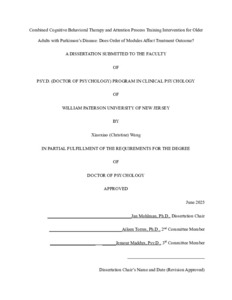Please use this identifier to cite or link to this item:
http://hdl.handle.net/20.500.12164/3501| Title: | Combined Cognitive Behavioral Therapy and Attention Process Training Intervention for Older Adults with Parkinson’s Disease: Does Order of Modules Affect Treatment Outcome? |
| Authors: | Wang, Xiaoxiao (Christine) |
| Keywords: | Psychology;Clinical psychology;Cognitive psychology;Attention process training;Cognitive behavioral therapy;Executive skills;Parkinson’s disease;Stroop color word test;Trail making test-B |
| Issue Date: | 2-Jul-2025 |
| Publisher: | William Paterson University |
| Abstract: | Parkinson’s Disease (PD) encompasses a wide range of non-motor disturbances such as anxiety, depression, and deficits in executive skills (ES), which are extremely common and often more disabling than motor symptoms. Anxiety and declining ES in older adults with PD are now considered prime targets for treatment optimization. Previous studies showed a combined intervention - Cognitive Behavioral Therapy (CBT) and Attention Process Training II – led to improvement in anxiety, depression, and complex cognitive abilities in older adults with PD. The current study sought to test the overall efficacy and compare two different versions of the combined APT-CBT treatment on anxiety and cognitive performance in older adults with PD: the CBT-first-group (n=8) and the APT-first group (n=8). The results indicated that the full sample benefited significantly from the combined APT/CBT intervention: Ham-A, Ham-D, and Trail Making Test-B (TMT-B) scores showed significant improvement; Stroop Color Word Test (StroopCW) showed near - significant improvement. The results also indicated that the order of the administration of APT or CBT did not yield significant differences on mood measures and cognitive measures. The current findings suggest that the combined APT and CBT intervention reduced the participants’ anxiety and depression significantly, and that the more complex skills have a higher predictive power than the lower order skills of the improvement of ES, pointing to the potential benefit of incorporating cognitive remediation programs to improve ES into the psychotherapy interventions for PD older adults with depression and anxiety. |
| URI: | http://hdl.handle.net/20.500.12164/3501 |
| Appears in Collections: | Theses & Dissertations |
Files in This Item:
| File | Description | Size | Format | |
|---|---|---|---|---|
| Wang_ParkinsonsCombinedTherapy.pdf | 625.38 kB | Adobe PDF |  View/Open |
Items in DSpace are protected by copyright, with all rights reserved, unless otherwise indicated.
